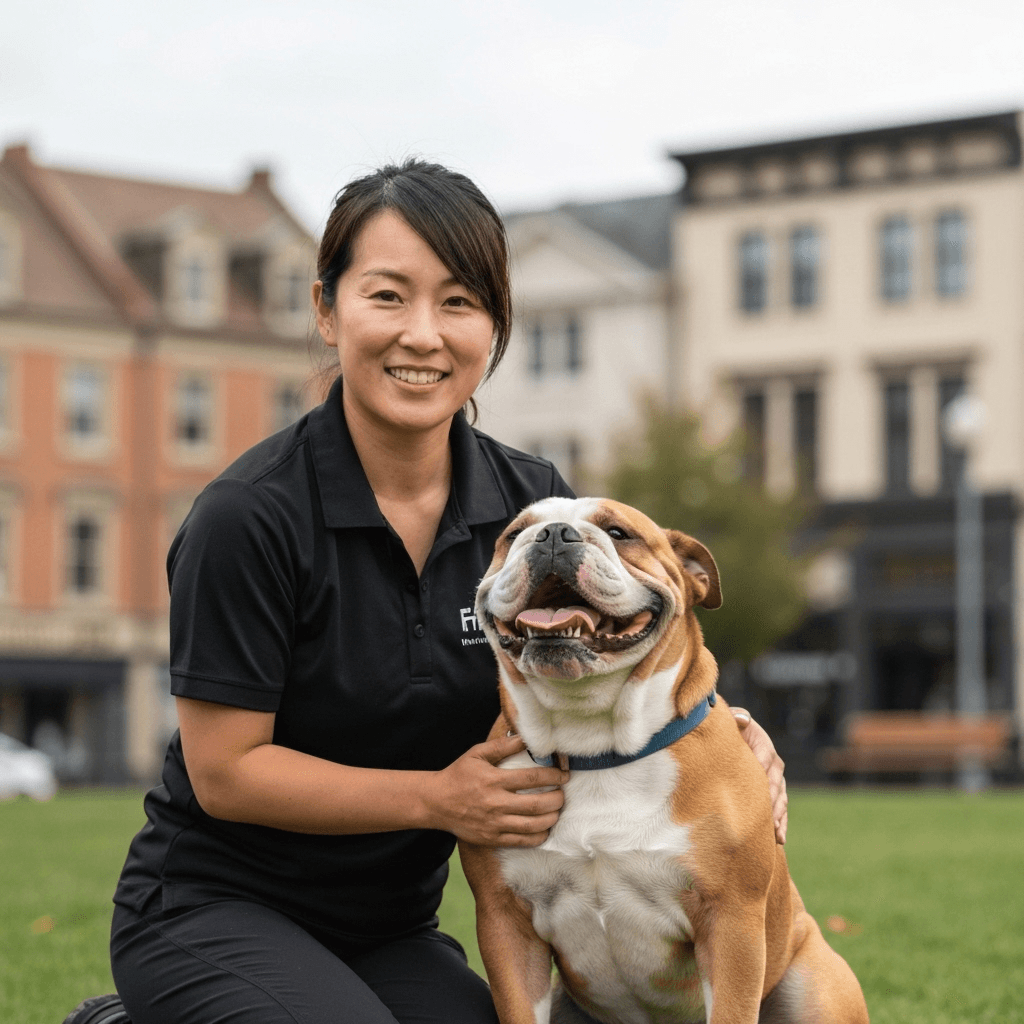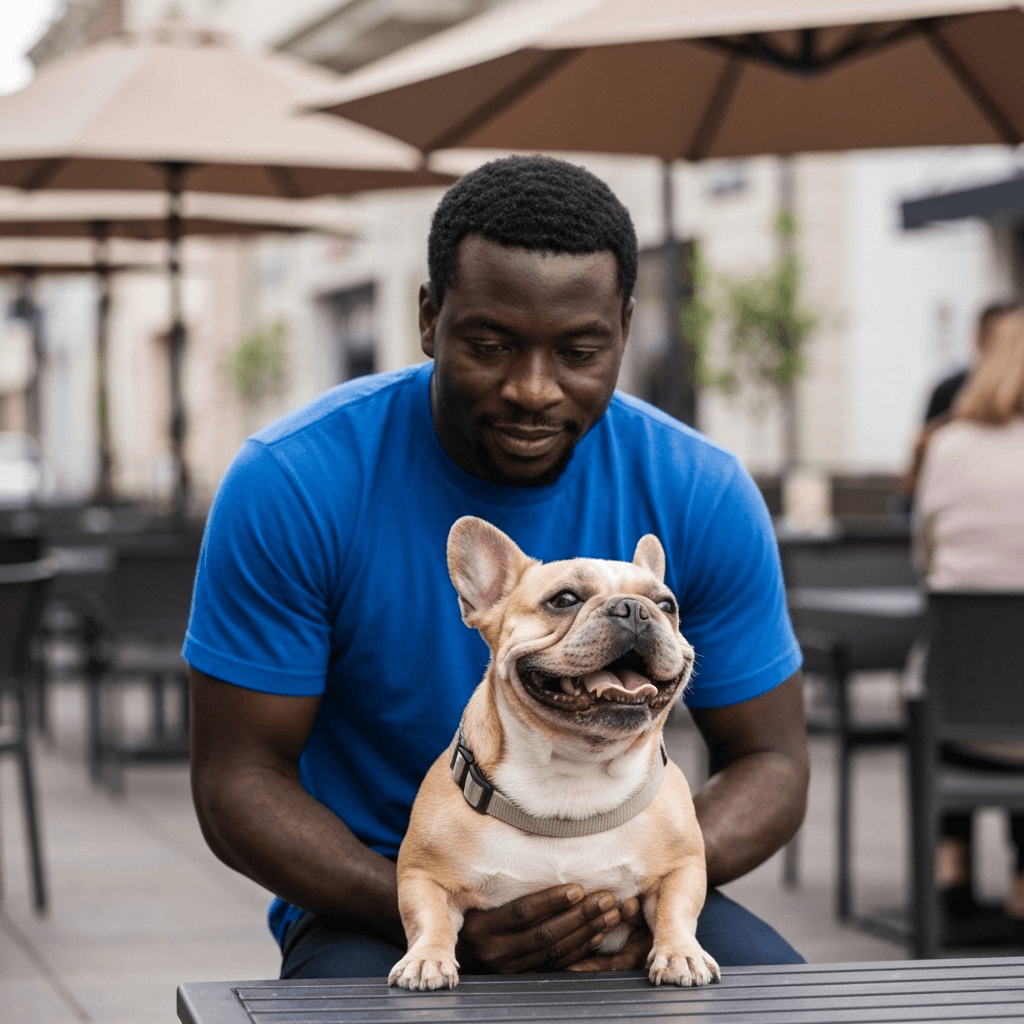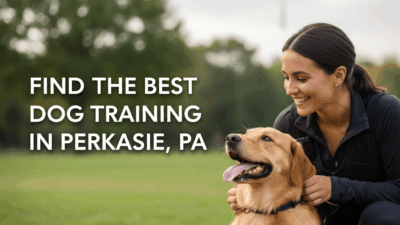Your Complete Guide to Choosing a Dog Trainer in Perkasie
When you’re walking your dog through Lenape Park or down Market Street on a busy Saturday, you want to know they’ll stay calm and focused on you. That’s what good training does – it prepares your dog for real life in Perkasie, from the trails around the South Perkasie Covered Bridge to the crowds at local events.
The best training programs teach your dog how to handle the specific situations you’ll face together. This means polite leash walking past other dogs, staying calm when kids run by, and settling nicely when you stop for coffee on Walnut Street.
How to Choose the Right Trainer
Start by looking for trainers who use positive reinforcement methods. These approaches work better for long-term results and keep your dog confident around the kids, neighbors, and other pets you’ll meet in town.
Check their credentials too. Look for certifications like KPA-CTP, CPDT-KA, or behavior specialists with IAABC-CDBC or CBCC-KA credentials. These show the trainer has studied modern methods and continues learning.
Think about what format works best for your situation. In-home training is perfect when you need help with door manners, jumping on guests, or walking nicely through your neighborhood. Group classes work well once your dog can focus around other dogs and people.
Some trainers offer specialized programs through CTC certification or hands-on testing like CPDT-KSA. Ask how they’ll adapt their methods to your specific needs, whether that’s apartment living, busy family life, or getting ready for Perkasie’s community events.
Common Dog Training Methods Explained

Good trainers focus on reward-based methods because they build your dog’s confidence and create positive associations with training. This matters when you’re out in public and need your dog to make good choices around distractions.
Basic obedience covers the foundation skills every Perkasie dog needs. Your dog learns sit, down, stay, loose-leash walking, reliable recall, and place commands. These skills help them handle everything from busy park trails to outdoor dining areas without pulling, jumping, or getting overwhelmed.
Puppy training starts early with socialization, house training, crate comfort, bite inhibition, and gentle leash introduction. Getting these basics right prevents problems from developing and sets your puppy up to enjoy all the experiences Perkasie has to offer.
Behavior modification addresses more complex issues like reactivity toward other dogs, separation anxiety, or resource guarding. These programs use careful desensitization and counterconditioning to help fearful or reactive dogs feel safer and make better choices.
You can choose between private lessons for personalized attention, group classes for socialization practice, or day training when you need faster results. Some trainers offer board and train programs, though these require careful transfer sessions to make sure the training sticks when your dog comes home.
Service dog training and therapy dog preparation require specialized public-access training and a structured plan from an experienced professional trainer.
Average Cost of Dog Training in Perkasie (Updated for 2025)
Training costs in Perkasie and Bucks County depend on the trainer’s experience, session length, and how far they travel. Here’s what you can expect to pay for different types of programs.
| Service Type | Average Cost (Perkasie/Bucks) | What’s Usually Included |
|---|---|---|
| Puppy classes (4–6 weeks) | $160–$280 total | Small groups, basics, socialization |
| Group obedience classes (4–6 weeks) | $170–$320 total | Leash skills, manners, homework |
| Private lessons (60–90 min) | $115–$195 per session | Customized coaching at home or a park |
| In-home packages (4–6 visits) | $450–$950 total | Step-by-step plan, between-session support |
| Day training (trainer works your dog) | $500–$1,000 per week | Trainer sessions + owner handoffs |
| Behavior consult (initial) | $150–$260 | History, assessment, written plan |
| Board and train (2–4 weeks) | $2,200–$4,800 total | Daily training + owner transfer sessions |
Complex behavior cases and travel to more remote areas of Upper Bucks typically cost more. Most trainers offer a brief phone consultation or meet-and-greet to see if you’re a good fit before you commit to a program.
Questions to Ask a Potential Dog Trainer
When you’re interviewing trainers, ask about their specific approach and how they’ll customize it for your dog:
- What methods do you use, and how do you keep sessions low-stress and humane?
- Which credentials do you hold, such as KPA-CTP or CPDT-KA, and do you pursue continuing education?
- How will you customize the training program for my dog and our Perkasie lifestyle?
- Do you offer private lessons, group classes, day training, or board and train, and which fits my goals?
- How will we measure progress between training sessions, and what homework will I have?
- Do you carry liability insurance, and can you provide proof?
- What’s included in pricing, are there travel fees, and what is your cancellation policy?
- For reactivity or aggression, will you coordinate with my veterinarian if needed?
Local Perkasie Resources for Dog Owners
Perkasie offers several great spots for training practice and exercise. Perkasie Dog Park in Lenape Park has fenced areas where you can work on recall and help your dog learn calm greetings with other dogs.
If you’re willing to drive a bit, Quakertown Dog Park at Memorial Park and Doylestown Dog Park at Turk Park offer additional off-leash practice opportunities. The Doylestown park requires membership but has well-maintained facilities and posted rules that help keep everyone safe.
For leashed training, the trails around Lenape Park and the South Perkasie Covered Bridge area give you chances to practice around real-world distractions like joggers, cyclists, and other dog walkers.
The Bucks County SPCA also provides community resources including microchipping services and educational events for responsible pet ownership.
Perkasie and Surrounding Areas: Rules That Affect Training
Understanding local rules helps you train more effectively and avoid problems. Leashes are required in all public areas throughout Perkasie except inside designated off-leash dog parks. You must clean up after your dog everywhere, including trails and green spaces.
Pennsylvania requires all dogs three months and older to be licensed through the county treasurer, and your dog must wear the license tag when in public. The state’s Bureau of Dog Law Enforcement explains licensing requirements and kennel rules on the Pennsylvania Dog Law page.
Rabies vaccination is required statewide. You can find guidance on prevention and exposure from the Pennsylvania Department of Health.
While trainers aren’t state-licensed in Pennsylvania, professional liability insurance is standard practice. If a trainer wants to run group sessions in a borough park, Perkasie may require permits and proof of insurance, so ask how your trainer handles this requirement.

Common Questions
How much does in-home dog training cost?
Most Perkasie trainers charge $115–$195 per visit for private sessions, with discounts available when you book multiple sessions. Complex behavior cases usually fall on the higher end of this range.
Is in-home dog training worth it?
Absolutely. Working at your home lets the trainer see exactly what happens at your front door, in your yard, and on your regular walking routes. Then you can practice skills in familiar places before moving to busier locations like the park.
Can you pay someone to house train your dog?
Many trainers include house training in their puppy programs or day training services. Make sure they give you clear daily steps to follow so you can maintain the progress between sessions.
What is the 3-3-3 rule for dog training?
This guideline suggests dogs need about 3 days to decompress in a new situation, 3 weeks to learn new routines, and 3 months to feel truly settled. Training programs that respect this timeline reduce stress and lead to better results.
How long will it take to reach my training goals?
Most puppies and well-socialized adult dogs show solid progress in 4–8 weeks with consistent daily practice. Dogs with reactivity or aggression issues often need several months of careful behavior modification work.
What should I bring to group classes?
Pack high-value treats your dog loves, fresh water, a flat collar or harness, a 6-foot leash, and vaccination records if the trainer requests them. Leave retractable leashes at home since they can be unsafe in group settings.
What’s the leash law in Perkasie?
Dogs must be leashed and under your control in all public areas. Off-leash play is only allowed inside designated dog parks. Check posted signs at parks for any seasonal restrictions or special rules.
Do I need a dog license in Perkasie or Bucks County?
Yes, Pennsylvania requires licensing for all dogs three months and older through the Bucks County Treasurer’s office. Your dog needs to wear the license tag whenever you’re in public.
What shots does my dog need in Bucks County or Pennsylvania?
Rabies vaccination is required by state law. Your veterinarian will likely recommend core vaccines like distemper-parvo and lifestyle vaccines such as bordetella based on your dog’s exposure risks. Check the Department of Health for current rabies requirements.
Are dog trainers required to be licensed in Perkasie or Bucks County or Pennsylvania?
No specific trainer licensing exists in Pennsylvania. However, facilities that board dogs for training may need a state kennel license under Dog Law. You can find details on the PA Dog Law website.
Where can I practice off-leash recall?
Use fenced dog parks like Perkasie Dog Park in Lenape Park, Quakertown Dog Park at Memorial Park, or the membership-based Doylestown Dog Park at Turk Park. Start during quieter times and keep training sessions short and positive.
Which dog parks allow training around Perkasie?
All the local fenced dog parks allow training within their off-leash areas: Perkasie Dog Park, Quakertown Dog Park at Memorial Park, and Doylestown Dog Park at Turk Park. Each park has posted rules you should follow during training sessions.
What beaches/trails allow dogs for training?
Focus on leashed training along borough trails like the paths in Lenape Park. For longer hiking adventures, Nockamixon State Park allows leashed dogs on trails and is just a short drive from Perkasie.
Do trainers need insurance to work in Perkasie parks?
Boroughs typically require permits and liability insurance for commercial activities in public parks. Ask potential trainers how they handle permits and insurance requirements before scheduling group classes in park locations.
Will a trainer coordinate with my veterinarian?
Many professional trainers will work with your vet, especially for cases involving reactivity, anxiety, or potential medication support. Ask how they share progress updates and when they recommend veterinary consultation.
The right trainer will understand what life in Perkasie looks like for you and your dog. Look for someone who uses humane methods, holds recognized credentials like dog trainer certifications such as KPA-CTP, CPDT-KA, IAABC-CDBC, CBCC-KA, or CTC, and creates a plan that fits your daily routine. With the right guidance, your dog will learn to enjoy everything our community has to offer while staying safe and well-behaved.
